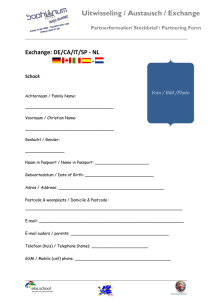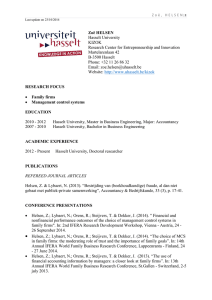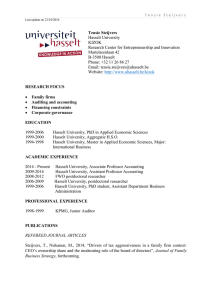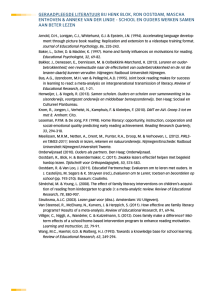List_of_publications_multilinks1 - Multilinks, an EU
advertisement
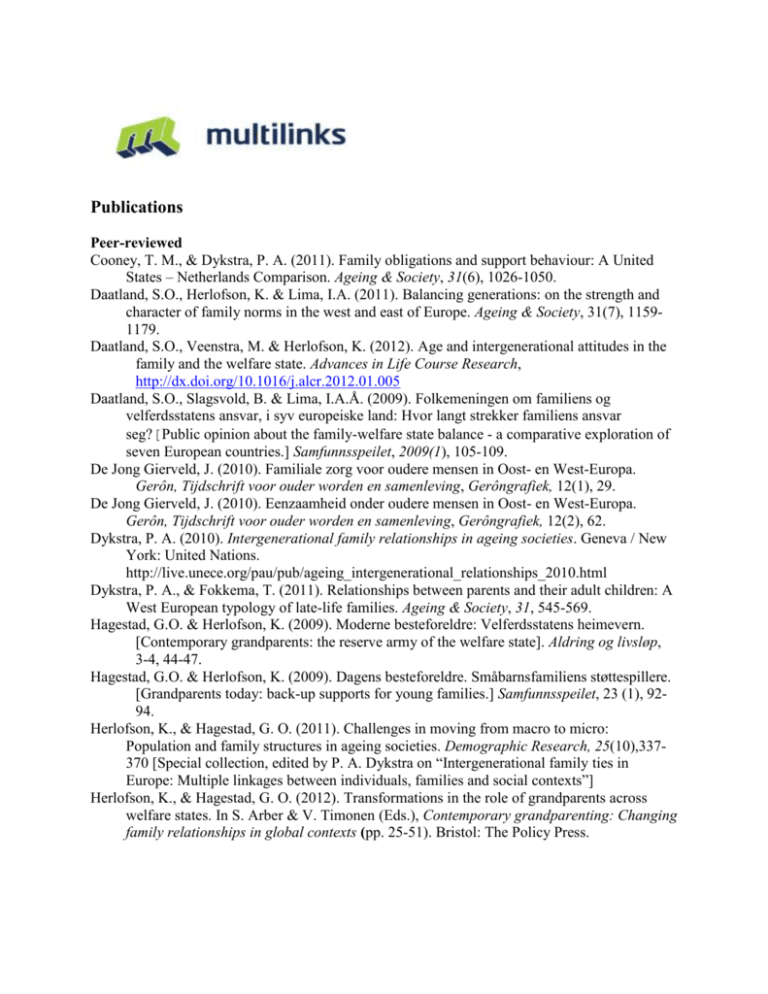
Publications Peer-reviewed Cooney, T. M., & Dykstra, P. A. (2011). Family obligations and support behaviour: A United States – Netherlands Comparison. Ageing & Society, 31(6), 1026-1050. Daatland, S.O., Herlofson, K. & Lima, I.A. (2011). Balancing generations: on the strength and character of family norms in the west and east of Europe. Ageing & Society, 31(7), 11591179. Daatland, S.O., Veenstra, M. & Herlofson, K. (2012). Age and intergenerational attitudes in the family and the welfare state. Advances in Life Course Research, http://dx.doi.org/10.1016/j.alcr.2012.01.005 Daatland, S.O., Slagsvold, B. & Lima, I.A.Å. (2009). Folkemeningen om familiens og velferdsstatens ansvar, i syv europeiske land: Hvor langt strekker familiens ansvar seg?[Public opinion about the family-welfare state balance - a comparative exploration of seven European countries.] Samfunnsspeilet, 2009(1), 105-109. De Jong Gierveld, J. (2010). Familiale zorg voor oudere mensen in Oost- en West-Europa. Gerôn, Tijdschrift voor ouder worden en samenleving, Gerôngrafiek, 12(1), 29. De Jong Gierveld, J. (2010). Eenzaamheid onder oudere mensen in Oost- en West-Europa. Gerôn, Tijdschrift voor ouder worden en samenleving, Gerôngrafiek, 12(2), 62. Dykstra, P. A. (2010). Intergenerational family relationships in ageing societies. Geneva / New York: United Nations. http://live.unece.org/pau/pub/ageing_intergenerational_relationships_2010.html Dykstra, P. A., & Fokkema, T. (2011). Relationships between parents and their adult children: A West European typology of late-life families. Ageing & Society, 31, 545-569. Hagestad, G.O. & Herlofson, K. (2009). Moderne besteforeldre: Velferdsstatens heimevern. [Contemporary grandparents: the reserve army of the welfare state]. Aldring og livsløp, 3-4, 44-47. Hagestad, G.O. & Herlofson, K. (2009). Dagens besteforeldre. Småbarnsfamiliens støttespillere. [Grandparents today: back-up supports for young families.] Samfunnsspeilet, 23 (1), 9294. Herlofson, K., & Hagestad, G. O. (2011). Challenges in moving from macro to micro: Population and family structures in ageing societies. Demographic Research, 25(10),337370 [Special collection, edited by P. A. Dykstra on “Intergenerational family ties in Europe: Multiple linkages between individuals, families and social contexts”] Herlofson, K., & Hagestad, G. O. (2012). Transformations in the role of grandparents across welfare states. In S. Arber & V. Timonen (Eds.), Contemporary grandparenting: Changing family relationships in global contexts (pp. 25-51). Bristol: The Policy Press. Herlofson, K. Slagsvold, B. & Lima, I.A. (2009). Ansvar for gamle foreldre - fra holdninger til handlinger [Filial responsibility - from attitudes to behaviour]. Aldring og Livsløp, 3-4, 36-43. Herlofson, K. Slagsvold, B. & Lima, I.A. (2009). Ansvar for gamle foreldre - fra holdninger til handlinger [Filial responsibility - from attitudes to behaviour]. Aldring og Livsløp, 3-4, 36-43. Heylen L. (2010). The older, the lonelier? Risk factors for social loneliness in old age. Ageing & Society 30(7), 1177-1196. Hogerbrugge, M., & Komter, A. E. (2011). Solidarity and ambivalence: comparing two perspectives on intergenerational relations using longitudinal panel data. The Journals of Gerontology: Series B, 67B(3), 372-383. Keck, W., & Saraceno, C. (2012). Multilinks database on intergenerational policy indicators. Schmollers Jahrbuch, 132, 1-9. Puur, A., Sakkeus, L., Põldma, A., Herm, A. (2011). Intergenerational family constellations in contemporary Europe: Evidence from the Generations and Gender Survey. Demographic Research, 25(4), 135-172. [Special issue on Intergenerational family ties in Europe: Multiple linkages between individuals, families and social contexts, edited by P. A. Dykstra] Saraceno C. (2011). Childcare needs and childcare policies: A multidimensional issue. Current Sociology, 59(1), 78-96. Saraceno, C. (2010). Social inequalities in facing old-age dependency: A bi-generational perspective. Journal of European Social Policy, 20(1), 32–44. Saraceno C. (2009). Le politiche della famiglia in Europa: tra convergenza e diversificazione [Family policy in Europe: Between convergence and divergence]. Stato e Mercato, 85 (April), 3-31. Saraceno, C. (2009). The impact of aging on intergenerational family relationships in the context of different family and welfare regimes. In J. Kocka, M. Kohli & W. Streeck (Eds), with K. Brauer & A. K. Skarpelis, Altern in Deutschland, Band 8: Altern: Familie, Zivilgesellschaft und Politik (Altern in Deutschland, Bd. 8, pp. 115 -132). Stuttgart: Stuttgart: Wissenschaftliche Verlagsgesellschaft. [Nova Acta Leopoldina, Band 106, Nr. 370, Deutsche Akademie der Naturforscher] Saraceno, C., & Keck, W. (2010). Can we identify intergenerational policy regimes in Europe? European Societies, 12(5), pp. 675-696. Saraceno, C., & Keck, W. (2011). Towards an integrated approach for the analysis of gender equity in policies supporting paid work and care responsibilities. Demographic Research, 25 (11), 371-406. [Special collection, edited by P. A. Dykstra on “Intergenerational family ties in Europe: Multiple linkages between individuals, families and social contexts”] Schenk, N., & Dykstra, P. A. (2012). Continuity and change in intergenerational family relationships: An examination of typology shifts over a three-year period. Available online 30 January 2012. http://dx.doi.org/10.1016/j.alcr.2012.01.004 Schenk, N., Dykstra, P.A., & Maas, I. (2009). De invloed van Europese verzorgingsstaten op financiële overdrachten binnen families: Een benadering op microniveau [The influence of European welfare states on transfers in families: A micro-level approach]. Mens en Maatschappij, 84, 249-278. 2 Schenk, N., Dykstra, P.A., & Maas, I. (2010). The role of European welfare states in intergenerational monetary transfers: a micro-level perspective. Ageing & Society, 30, 1315-1342. Slagsvold, B., Daatland, S.O., Brunborg, H. & Lima, I.A.Å. (2009). Holdninger til ansvar for gamle foreldre, i syv europeiske land: Er vi villig til å ta oss av gamle mor og far? [Attitudes to filial responsibility in seven European countries. Are we willing to care for old parents?] Samfunnsspeilet, 2009(1), 99-104. Forthcoming Aassve, A., Arpino, B., & Goisis, A. (2012). Grand-parenting and mothers’ labour force participation. Demographic Research [Special issue on Intergenerational family ties in Europe: Multiple linkages between individuals, families and social contexts, edited by P. A. Dykstra] Boudiny, K., Mortelmans, D. (2011). A critical perspective: Towards a broader understanding of ‘Active Ageing’. E-Journal of Applied Psychology. De Jong Gierveld, J., Dykstra, P. A., & Schenk, N. (2012). Living arrangements, intergenerational support types and older adult loneliness in Eastern and Western Europe. Demographic Research [Special issue on Intergenerational family ties in Europe: Multiple linkages between individuals, families and social contexts, edited by P. A. Dykstra] Jappens, M., & Van Bavel, J. (2011). Regional family cultures and childcare by grandparents in Europe. Demographic Research [Special issue on Intergenerational family ties in Europe: Multiple linkages between individuals, families and social contexts, edited by P. A. Dykstra] Moor, N., & Komter, A. E. (2012). Family ties and depressive mood in Eastern and Western Europe. Demographic Research [Special issue on Intergenerational family ties in Europe: Multiple linkages between individuals, families and social contexts, edited by P. A. Dykstra] Saraceno C. (2011). Rapporti e obbligazioni intergenerazionali in Europa. Tra demografia e contesti istituzionali [Relationships and family obligations in Europe: Between demography and institutional contexts]. In M. Naldini, C. Solera, & P. Torrioni (Eds.), Corsi di vita, generazioni e mutamento sociale. Bologna: il Mulino. Under Review Heylen, L., Mortelmans, D., Boudiny, K., & Hermans, M. (2011). The intermediate effect of geographic proximity on intergenerational support: A comparison of France and Bulgaria. Under review. Hogerbrugge, M., & Komter, A. E. (2011). Dissolving long-term partner relationships: Assessing the influence of social context. Under review. Keck, W., & Saraceno, C. (2011). Towards an integrated approach for the analysis of gender equity in policies supporting paid work and care responsibilities. Under review. Moor, N., & Komter, A. E. (2011). The impact of family structure and disruption on intergenerational emotional support. Under review. Moor, N., Komter, A. E., & De Graaf, P. (2011). Differences in subjective well-being among the elderly across Europe: Who are the most vulnerable? Under review. Schenk, N., Dykstra, P.A., & Maas, I. (2011). Older adults’ networks and public care receipt. Do partners and adult children substitute for unskilled public care? Under review. 3 Wijckmans, B., & Van Bavel, J. (2011). Family obligations and divorce in the parent and adult child generation. Under review. Yerkes, M., Schenk, N., & Dykstra, P. A. (2011). Part-time work in Europe: A multilevel approach. Under review. Deliverables (by number) Saraceno, C., & Keck, W. (2008). The institutional framework of intergenerational family obligations in Europe: A conceptual and methodological overview. Deliverable 1.1 for the FP-7 funded project “How demographic changes shape intergenerational solidarity, wellbeing, and social integration: A multilinks framework”. http://www.multilinksproject.eu/uploads/papers/0000/0010/Report_Saraceno_Keck_Nov08.pdf Keck, W., Hessel, P., & Saraceno, C. (2009). Database on intergenerational policy indicators: Methodological report. Deliverable 1.2 for the FP-7 funded project “How demographic changes shape intergenerational solidarity, well-being, and social integration: A multilinks framework”. http://www.multilinks-project.eu/uploads/papers/0000/0016/technical-reportversion-1-2.pdf Saraceno, C., & Keck, W. (2010). Can we identify intergenerational policy regimes in Europe? Deliverable 1.3 for the FP-7 funded project “How demographic changes shape intergenerational solidarity, well-being, and social integration: A multilinks framework”. http://www.multilinksproject.eu/uploads/papers/0000/0042/intergenerational_regimes_for_Multinks_D1.3.pdf Heylen, L. & Mortelmans, D. (2009). Explaining parent-child proximity in Eastern and Western Europe: A micro and macro perspective. Deliverable 2.1 for the FP-7 funded project “How demographic changes shape intergenerational solidarity, well-being, and social integration: A multilinks framework”. http://www.multilinksproject.eu/uploads/papers/0000/0014/Deliverable_1_-_Cello_-_Heylen-Mortelmans.pdf Heylen, L., Mortelmans, D., Boudiny, K., & Hermans, M. (2010). The intermediate effect of geographic proximity on intergenerational support. A comparison of France and Bulgaria. Deliverable 2.2 for the FP-7 funded project “How demographic changes shape intergenerational solidarity, well-being, and social integration: A multilinks framework”. http://www.multilinks-project.eu/uploads/papers/0000/0033/Deliverable_2__The_intermediate_effect_of_geographic_proximity_on_intergenerational_support.pdf De Jong Gierveld, J., Dykstra, P. A., & Schenk, N. (2011). Living arrangements, intergenerational support types and older adult loneliness in Eastern and Western Europe. Deliverable 2.3 for the FP-7 funded project “How demographic changes shape intergenerational solidarity, well-being, and social integration: A multilinks framework”. http://www.multilinksproject.eu/uploads/papers/0000/0041/Multilinks_deliverable_D2.3.pdf Puur, A., Sakkeus, L, Schenk, N., Põldma, A. (2009). Family constellations in Europe. Deliverable 3.1 for the FP-7 funded project “How demographic changes shape intergenerational solidarity, well-being, and social integration: A multilinks framework”. http://www.multilinksproject.eu/uploads/papers/0000/0019/Family_constellations_in_EuropeWP3_final.pdf Moor, N., & Komter, A. E. (2010). The impact of demographic changes on intergenerational solidarity in families. Deliverable 3.2 for the FP-7 funded project “How demographic 4 changes shape intergenerational solidarity, well-being, and social integration: A multilinks framework”. http://www.multilinksproject.eu/uploads/papers/0000/0036/impact_of_demographic_changes_D3.2__Moor___K omter_.pdf Moor, N., & Komter, A. E. (2011). Consequences of intergenerational family solidarity for mental health: Family ties as buffers or stressors? Deliverable 3.3 for the FP-7 funded project “How demographic changes shape intergenerational solidarity, well-being, and social integration: A multilinks framework”. http://www.multilinksproject.eu/uploads/papers/0000/0037/consequences_of_intergenerational_solidarity_D3.3_ _Moor___Komter_.pdf Hagestad, G. O. (2011). Views on life course markers and life phases of men and women: Some findings from the European Social Survey. Deliverable 4.1 for the FP-7 funded project “How demographic changes shape intergenerational solidarity, well-being, and social integration: A multilinks framework”. Van Bavel, J., & Dykstra, P. A., Wijckmans, B. & Liefbroer, A. C. (2010). Demographic change and family obligations. Deliverable 4.2 for the FP-7 funded project “How demographic changes shape intergenerational solidarity, well-being, and social integration: A multilinks framework”. http://www.multilinksproject.eu/uploads/papers/0000/0022/Van_Bavel_Dykstra_Wijckmans_Liefbroer__Multilinks_Deliverable_4_2.pdf Herlofson, K., Hagestad, G.O., Slagsvold, B. & Sørensen, A.-M. (2011). Intergenerational family responsibilities in Europe. Deliverable 4.3 for the FP-7 funded project “How demographic changes shape intergenerational solidarity, well-being, and social integration: A multilinks framework”. http://www.multilinksproject.eu/uploads/papers/0000/0038/herlofson_deliverable.pdf Aassve, A., Arpino, B., & Robette, N. (2009). Short report on methodology for analyzing intergenerational relationships in a comparative perspective. Deliverable 5.1 for the FP-7 funded project “How demographic changes shape intergenerational solidarity, well-being, and social integration: A multilinks framework”. http://www.multilinksproject.eu/uploads/papers/0000/0013/methods_report.pdf Aassve, A., Arpino, B., & Goisis, A. (2009). Report on the comparative study on intergenerational transfers and women’s labour force participation. Deliverable 5.2 for the FP-7 funded project “How demographic changes shape intergenerational solidarity, wellbeing, and social integration: A multilinks framework”. http://www.multilinksproject.eu/uploads/papers/0000/0015/Report_on_intergenerational_transfers_and_employ ment.pdf Dykstra, P. A., & Fokkema, T. (2011). Report on the comparative study of intergenerational transfers and social integration. Deliverable 5.3 for the FP-7 funded project “How demographic changes shape intergenerational solidarity, well-being, and social integration: A multilinks framework”. http://www.multilinksproject.eu/uploads/papers/0000/0044/MULTILINKS_deliverable_5.3.pdf Dykstra, P. A. (2011). Key findings from the multilinks research programme. Deliverable 6.1 for the FP-7 funded project “How demographic changes shape intergenerational solidarity, well-being, and social integration: A multilinks framework”. Saraceno, C., & Keck, W. (2011). The Multilinks data base on the institutional framework of intergenerational family obligations in Europe: Conceptual framework, indicators and first 5 analyses. Deliverable 6.2 for the FP-7 funded project “How demographic changes shape intergenerational solidarity, well-being, and social integration: A multilinks framework”. http://www.multilinksproject.eu/uploads/papers/0000/0045/MULTILINKS_deliverable_6_2.pdf Aassve, A. (2011). Report on methodology issues in the Multilinks project. Deliverable 6.3 for the FP-7 funded project “How demographic changes shape intergenerational solidarity, well-being, and social integration: A multilinks framework”. http://www.multilinksproject.eu/uploads/papers/0000/0040/Aassve_-_methods_report_FINAL.pdf Policy Briefs Saraceno, C., Keck, W., & Dykstra, P. A. (2009). Legal and policy frameworks regulating intergenerational obligations. First European Policy Brief for the FP-7 funded project “How demographic changes shape intergenerational solidarity, well-being, and social integration: A multilinks framework”. Liefbroer, A.C. (2009). European’s opinions on the timing of retirement. Second European Policy Brief for the FP-7 funded project “How demographic changes shape intergenerational solidarity, well-being, and social integration: A multilinks framework”. Schenk, N., & Dykstra, P. A. (2010). Testing how welfare state arrangements might shape intergenerational family solidarity. Third European Policy Brief for the FP-7 funded project “How demographic changes shape intergenerational solidarity, well-being, and social integration: A multilinks framework”. Puur, A., Sakkeus, L, Schenk, N., Põldma, A., & Dykstra, P. A. (2010). New insights on kin availability, using the Generations & Gender Surveys. Fourth European Policy Brief for the FP-7 funded project “How demographic changes shape intergenerational solidarity, well-being, and social integration: A multilinks framework”. Aassve, A., & Robette, N. (2011). Family paths and their implications for economic wellbeing and happiness. Fifth European Policy Brief for the FP-7 funded project “How demographic changes shape intergenerational solidarity, well-being, and social integration: A multilinks framework”. Dykstra, P. A. (2011). Key findings from MULTILINKS. Sixth European Policy Brief for the FP-7 funded project “How demographic changes shape intergenerational solidarity, wellbeing, and social integration: A multilinks framework”. Reports Aassve, A., Arpino, B., & Goisis, A. (2011). Grandparenting and mother's labour force participation: A comparative analysis using the Generations and Gender Survey. Dondena Working Paper, 36. Aassve, A. Arpino, B., & Bordone, V. (2012). Grandparents in Europe: The role of policies. Dondena Working Paper, 51. Aassve, A., Meroni, E., & Pronzato, C. (2011). Grandparenting and childbearing in the extended family. Dondena Working Paper, 38. Arpino, B., Pronzato, C., & Tavares, L.P. (2010). All in the family: Informal childcare and Mothers' Labour Market Participation. Working Paper of the Institute for Social and Economic Research (ISER).Colchester: Universityof Essex. 6 Daatland, S.O., Slagsvold, B., & Lima, I.A. (2009). Population ageing, intergenerational solidarity and the family-welfare state balance: a comparative exploration. Proceedings from the 2008 GGP Conference How generations and gender shape demographic change: Towards policies based on better knowledge (pp. 127-138). United Nations Economic Commission for Europe, ECE/HBP/154. New York and Geneva: United Nations. De Jong Gierveld, J. (2009). Living arrangements, family bonds and the regional context affecting social integration of older adults in Europe. Proceedings from the 2008 GGP Conference How generations and gender shape demographic change: Towards policies based on better knowledge (pp. 107-125). United Nations Economic Commission for Europe, ECE/HBP/154. New York and Geneva: United Nations. De Jong Gierveld, J. (2010). Living arrangements and differences in family support: A comparative perspective. Proceedings from the 2009 Conference ‘Family support networks and population ageing’ (pp. 72-76). Doha, Qatar. Dykstra, P. (2009). Intergenerational relationships in ageing societies. United Nations Economic Commission for Europe Working Group on Ageing, ECE/WG.1/2009/5. Różańska-Putek, J., Jappens, M., Willaert, D., & Van Bavel, J. (2009). Recoding the regions of the European Social Survey into the NUTS 1 regional classification. Interface Demography Working Paper 2009-6, Vrije Universiteit Brussel. Schwanitz, K. V. (2010). Levels of co-residence across European regions. MSc Thesis Research Master programme ‘Sociology and Social Research (SaSR)’, Utrecht University, the Netherlands. Wijckmans, B., & Van Bavel, J. (2010). Divorce and intergenerational family obligations. Past research and current patterns in the Netherlands. Interface Demography Working Paper 2010-1, Vrije Universiteit Brussel. Van Bavel, J., & De Winter, T. (2011). Becoming a grandparent and early retirement in Europe. Bamberg, Germany: ESF TransEurope Social Science Research Network. TransEurope Working Paper 28. 7
